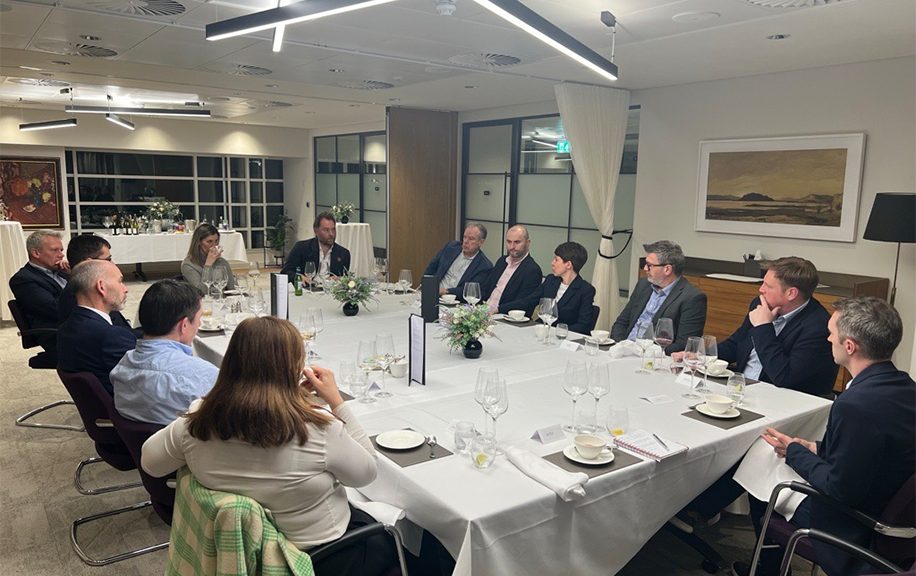Contact the team at FWB Park Brown to discuss your individual or company requirements, or to discover more about our specialist services.
Executive Summary – Covid-19 Business Forums, Aberdeen | 20th April – 1st May
11 May 2020
- Thought Leadership
Executive Leadership Forum
The oil price will remain volatile throughout 2020 until the supply and demand curve balances back out. The sharp drop in oil price (both WTI & Brent) was perhaps not anticipated this quickly and there is a notion that current production cut agreements will not be enough to resume to stability quickly. A significant percentage of world demand for oil comes from transportation and specifically the aviation sector and thus, current lockdown restrictions and uncertainty around when these will be lifted globally is making it challenging for oil & gas sector businesses to judge and plan ahead.
Initially for many businesses, speed was of the essence with respect to making decisions around furloughing staff and restructuring the organisation to preserve cash. Many participants agreed that whilst these were practical steps to take in the short-term, in the long-term major issues still exist for the sector. It was highlighted that the UK government job retention scheme in particular is perhaps a ‘false friend’, plugging a necessary gap right now however, tough decisions around workforce planning still lie ahead for employers.
FWB Park Brown’s Aberdeen office has been hosting a number of leadership forums facilitating discussion between groups of: Non Executive Directors, Chief Financial Officers, HR Directors as well as the broader Executive Leadership team, focused on sharing issues and learnings from Covid-19 and the future business landscape.
Whilst the themes and challenges vary between each forum, there are common points and insights throughout, of which we have noted.
A full list of upcoming forums can be viewed at the end of this article.
There was a sentiment that the oil & gas sector may look very different as we start to emerge from Covid-19, perhaps more consolidated and smaller as some businesses struggle to survive or lose talent. Some organisations are utilising this period as an opportunity to streamline internal process and adapt to a more effective and efficient way of working, enabling a more agile and flexible approach in future. It was noted that continued pressure on the oil & gas supply chain from a price point perspective will not be helpful and that Operators will need to be more open-minded around how ways to reduce costs, that have less of an impact on margins.
It was prevalent that as time has moved on, the situation has evolved and many organisations are now turning their attention to ‘what next’. Now that the initial upheaval Covid-19 caused has begun to settle, the focus has turned to considering the long-term and what the ‘new-norm’ might look like in a depressed oil market and in a post-Covid-19 environment. Though some participants were at the early stage of their planning process in this respect, it is positive to see the shift from ‘short-term survival’ to long-term strategy.
Organisations are beginning to looks towards the practicalities of their workforces returning to work and anticipate this will be a focus of discussions in subsequent forums.
Non Executive Directors Forum
There is a challenge in managing the variations in country responses to the COVID-19 crisis, which is presenting operational difficulties for many organisations. These variations could put businesses at a commercial and contractual disadvantage as the situation evolves. Organisations are continuing to forecast frequently and plan for various scenarios in attempt to manage some of the uncertainty however, the pace of change and varying levels of support for organisations from each country’s respective government is making this difficult.
The immediate challenge continues to be the preservation of cash in the short-term however, NED’s are encouraging their executive teams to look forward to the future. CEO’s will be largely focused on the day to day and may get pulled into the detail. The role of the NED is to ensure the CEO looks more broadly at what is happening and challenge executive teams on what the new norm should look like. This is likely to be a catalyst for change with respect to new business models, structure and leadership. It was discussed that NED’s should challenge their CEO to be radical in their thinking and reflect on what the business needs to look like in future.
It was also highlighted that the NED needs to be an active participant in the business right now. The responsibilities and obligations are the same as a Director therefore, they also need to be visible from a communications perspective. Furthermore, many NED’s are concerned about the mental health of their executive teams, particularly where they are carrying decisions and scenarios that are yet to be delivered. Ensuring the Chair/NED and CEO relationship is strong during this time and you are viewed as a critical friend is crucial.
Chief Financial Officer Forum
The majority of participants had utilised some form of government backed support, most notably the Job Retention Scheme, and were positive around the support received thus far from HMRC. There were examples of some organisations having successfully deferred PAYE, NIC and VAT payments which was supporting cash flow in the short-term.
The key challenge seemed to be longer-term, with many organisations (from the oil & gas sector in particular) anticipating a sharp drop in revenue in Q3. It was suggested that further governmental support will be required in Q2 to help businesses survive. Forecasting remains a challenge for CFO’s, particularly where there are global operations to take into account. The varying degrees of support for businesses in different countries and country responses have caused difficulties in predicting what things will look like further down the line for organisations and their customer base.
This being said, businesses are trying to ensure that the focus remains on the long-term. In the oil & gas sector, the 2014 price decline saw many organisations restructure and pivot their business for survival, including through sector diversification. It was discussed that the issues encountered today have reinforced the importance and benefits of diversification, and in some cases have accelerated organisations strategic plans From an M&A perspective, while in the short-term many plans have been shelved, post Covid-19 and once there is some stability back in the market, there will be opportunities that exist for many organisations which weren’t there before. Some organisations are expecting to return to work with a smaller workforce and it is likely that there will be more consolidation in the oil & gas market to come.
HR Leadership
HR professionals continue to work at pace to keep up with the rapidly changing environment and subsequent guidance from governments both locally and internationally. Many organisations are keeping a keen eye on other countries progress with respect to the lifting of restrictions and the return to work to inform their planning.
The majority of participants were operating with a smaller workforce having utilised the government job retention scheme or taken the decision to make redundancies as a result of the oil price decline. Whilst many continue to work through some of the operational challenges this change was causing, there was a sense that the attention is starting to be on the shape of the workforce and what needs to be in place with regards to the design of the workplace post-lockdown. This is particularly true for those in manufacturing industries, where there is a need for physical presence on site.
Some participants within the manufacturing space had already started the process of bringing employees back into the workplace having initially furloughed a significant number and shut down operations. Time has given these businesses some opportunity to put procedures in place to create a safe environment based around government guidelines. Communication has been critical throughout this period to help employees understand what has been put in place / what is being put in place for their protection.
There remains a challenge for the UK with respect to acquiring PPE for the workforce, and whether the government will change their stance on the need for masks in public places is also something organisations are keen to ascertain. The Scottish government have very recently this week moved towards recommending this, though have not gone beyond an advisory position on the matter.
There was a concern raised around selecting groups of employees to return to work and ensuring this process is fair. A number of different approaches were discussed amongst the group. These included:
- Selecting employees based on their skillset and specifically, multi-skilled employees were planned to be utilised first.
- Putting out a call for employees who would like to volunteer themselves to return to work. Though this may require more upfront work to manage the process, it was felt this might eliminate some risk around employees who may not yet feel comfortable returning to work.
- The lottery approach, i.e. drawing names at random. This approach allows for fairness and transparency, though some concerns were raised that this may not take into account individual circumstances.
- Data led – utilising workforce data to identify potentially vulnerable groups for example.
Some organisations were already experiencing challenges around employees raising concerns around returning to work and in some cases, refusing to return at this moment in time. There were varying rationales behind this including for example, continued childcare issues as a result of UK school closures. Other reasons also included general anxiety from employees around being in the workplace as well as commuting to and from the workplace (particularly where public transport is being utilised) whilst the pandemic is still ongoing. Whilst there may be flexibility for office-based staff due to home working arrangements, returning to work may prove challenging for others required in a physical workplace, until some confidence is restored. Consistent communication with staff to help alleviate some of these challenges was discussed. It was suggested that informal communication forums (e.g Zoom ‘coffee-breaks’) where employees may be more likely to openly share their thoughts and feelings on these issues, may be useful in this situation.
Looking ahead, many organisations see significant changes afoot with respect to what the workplace and workforce will look like. It was agreed that the thinking of HR leaders needs to go beyond the here and now and look at what fundamental changes we can make to the way we work, to position the business well for the future.
For a downloadable copy of the above article please click here.
[divider line_type=”Full Width Line” line_thickness=”1″ divider_color=”default”]
FWB Park Brown
FWB Park Brown continues to deliver its full range of services which includes providing support and advice during the Covid- 19 Public Health and developing global economic crisis.
We have established a range of cross sector as well as sector focused discussion forums for Chairs, NEDs, CEOs and all the main business management disciplines. We are also working closely with the Scottish HR Leadership Group to provide constructive support including discussion forums and Q & As.
Summaries of the discussions will be posted on our news section and also on LinkedIn.
For further information about any of these forums please contact us via enquiries@fwbparkbrown.com

